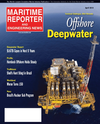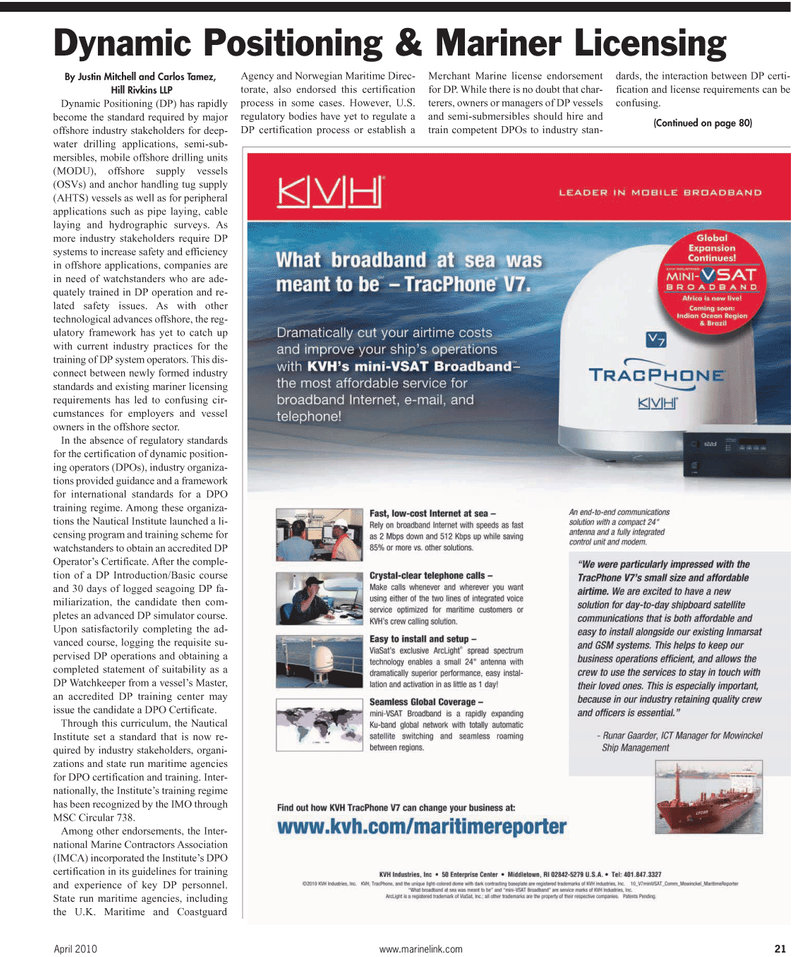
Page 21: of Maritime Reporter Magazine (April 2, 2010)
Read this page in Pdf, Flash or Html5 edition of April 2, 2010 Maritime Reporter Magazine
April 2010 www.marinelink.com 21
By Justin Mitchell and Carlos Tamez,
Hill Rivkins LLP
Dynamic Positioning (DP) has rapidly become the standard required by major offshore industry stakeholders for deep- water drilling applications, semi-sub- mersibles, mobile offshore drilling units (MODU), offshore supply vessels (OSVs) and anchor handling tug supply (AHTS) vessels as well as for peripheral applications such as pipe laying, cable laying and hydrographic surveys. As more industry stakeholders require DP systems to increase safety and efficiency in offshore applications, companies are in need of watchstanders who are ade- quately trained in DP operation and re- lated safety issues. As with other technological advances offshore, the reg- ulatory framework has yet to catch up with current industry practices for the training of DP system operators. This dis- connect between newly formed industry standards and existing mariner licensing requirements has led to confusing cir- cumstances for employers and vessel owners in the offshore sector.
In the absence of regulatory standards for the certification of dynamic position- ing operators (DPOs), industry organiza- tions provided guidance and a framework for international standards for a DPO training regime. Among these organiza- tions the Nautical Institute launched a li- censing program and training scheme for watchstanders to obtain an accredited DP
Operator’s Certificate. After the comple- tion of a DP Introduction/Basic course and 30 days of logged seagoing DP fa- miliarization, the candidate then com- pletes an advanced DP simulator course.
Upon satisfactorily completing the ad- vanced course, logging the requisite su- pervised DP operations and obtaining a completed statement of suitability as a
DP Watchkeeper from a vessel’s Master, an accredited DP training center may issue the candidate a DPO Certificate.
Through this curriculum, the Nautical
Institute set a standard that is now re- quired by industry stakeholders, organi- zations and state run maritime agencies for DPO certification and training. Inter- nationally, the Institute’s training regime has been recognized by the IMO through
MSC Circular 738.
Among other endorsements, the Inter- national Marine Contractors Association (IMCA) incorporated the Institute’s DPO certification in its guidelines for training and experience of key DP personnel.
State run maritime agencies, including the U.K. Maritime and Coastguard
Agency and Norwegian Maritime Direc- torate, also endorsed this certification process in some cases. However, U.S. regulatory bodies have yet to regulate a
DP certification process or establish a
Merchant Marine license endorsement for DP. While there is no doubt that char- terers, owners or managers of DP vessels and semi-submersibles should hire and train competent DPOs to industry stan- dards, the interaction between DP certi- fication and license requirements can be confusing.
Dynamic Positioning & Mariner Licensing (Continued on page 80)

 20
20

 22
22
